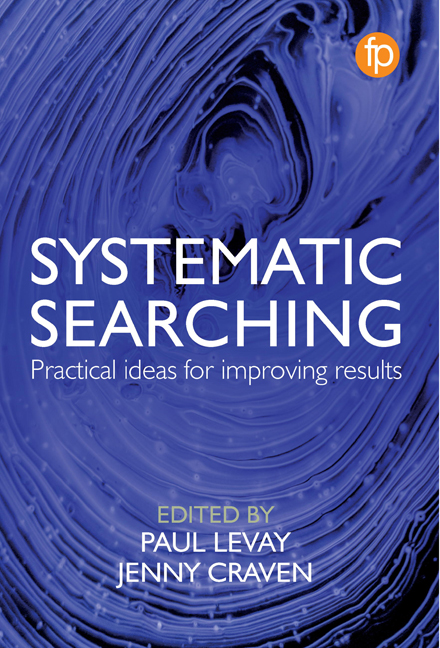Book contents
- Frontmatter
- Contents
- Figures, tables and case studies
- Contributors
- Acknowledgements
- Abbreviations
- Foreword
- 1 Introduction: where are we now?
- 2 Innovative approaches to systematic reviewing
- 3 Searching for broad-based topics
- 4 Choosing the right databases and search techniques
- 5 Gathering evidence from grey literature and unpublished data
- 6 Social media as a source of evidence
- 7 Text mining for information specialists
- 8 Using linked data for evidence synthesis
- 9 Evidence surveillance to keep up to date with new research
- 10 Training the next generation of information specialists
- 11 Collaborative working to improve searching
- 12 Communication for information specialists
- 13 The information specialist as an expert searcher
- 14 Conclusion: where do we go from here?
- Glossary
- Index
7 - Text mining for information specialists
Published online by Cambridge University Press: 08 June 2019
- Frontmatter
- Contents
- Figures, tables and case studies
- Contributors
- Acknowledgements
- Abbreviations
- Foreword
- 1 Introduction: where are we now?
- 2 Innovative approaches to systematic reviewing
- 3 Searching for broad-based topics
- 4 Choosing the right databases and search techniques
- 5 Gathering evidence from grey literature and unpublished data
- 6 Social media as a source of evidence
- 7 Text mining for information specialists
- 8 Using linked data for evidence synthesis
- 9 Evidence surveillance to keep up to date with new research
- 10 Training the next generation of information specialists
- 11 Collaborative working to improve searching
- 12 Communication for information specialists
- 13 The information specialist as an expert searcher
- 14 Conclusion: where do we go from here?
- Glossary
- Index
Summary
Introduction
Information specialists search resources to identify information to answer research questions. Typically, we investigate the questions, identify relevant sources of information that might answer those questions, search those sources and retrieve documents. We may also be involved in managing retrieved records and documents and sometimes we also select information from the records or documents that may be most relevant to the questions being asked. Sometimes information specialists produce summaries of the most relevant information.
Information specialists have been undertaking these tasks for decades and many textbooks and guidance documents are available to support them. New techniques are constantly developing which can help with information retrieval and it is important to assess and appreciate what they may offer. New text mining tools, which analyse the frequency and relationship of words in texts, are growing in number and availability. These tools may be particularly relevant and attractive to information specialists developing searches for systematic reviews since text mining can assist with developing searches for broad-based and hard to define topics. It can also provide opportunities to manage and process large volumes of records, which can be a challenge for some research questions.
The use of text mining is not yet standard practice in systematic review searching and indeed is not necessary for many non-complex topics. However, its potential is being recognised and explored and it has been subject to several recent scoping reviews in the health sector. In disciplines where systematic reviews are not yet a common method, an awareness of the potential value of text mining is likely to be similarly low. Outside of the systematic review context, information specialists should also find that text mining is useful for many tasks needing textual analysis, including assessing terminology in complex topics, for appreciating the concepts being covered within a specific literature and for undertaking a variety of citation analyses.
This chapter presents an overview of what text mining tools have to offer for all disciplines and their potential value to information specialists. Table 7.1 (pages 165–7) contains the names and website addresses of all the text mining tools referred to in this chapter.
- Type
- Chapter
- Information
- Systematic SearchingPractical ideas for improving results, pp. 147 - 170Publisher: FacetPrint publication year: 2018



